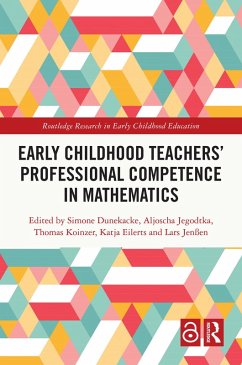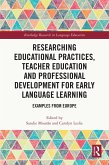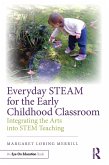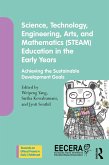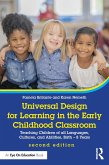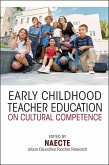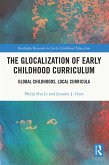Early Childhood Teachers' Professional Competence in Mathematics (eBook, PDF)
Redaktion: Dunekacke, Simone; Jenßen, Lars; Eilerts, Katja; Koinzer, Thomas; Jegodtka, Aljoscha
41,95 €
41,95 €
inkl. MwSt.
Sofort per Download lieferbar

21 °P sammeln
41,95 €
Als Download kaufen

41,95 €
inkl. MwSt.
Sofort per Download lieferbar

21 °P sammeln
Jetzt verschenken
Alle Infos zum eBook verschenken
41,95 €
inkl. MwSt.
Sofort per Download lieferbar
Alle Infos zum eBook verschenken

21 °P sammeln
Early Childhood Teachers' Professional Competence in Mathematics (eBook, PDF)
Redaktion: Dunekacke, Simone; Jenßen, Lars; Eilerts, Katja; Koinzer, Thomas; Jegodtka, Aljoscha
- Format: PDF
- Merkliste
- Auf die Merkliste
- Bewerten Bewerten
- Teilen
- Produkt teilen
- Produkterinnerung
- Produkterinnerung

Bitte loggen Sie sich zunächst in Ihr Kundenkonto ein oder registrieren Sie sich bei
bücher.de, um das eBook-Abo tolino select nutzen zu können.
Hier können Sie sich einloggen
Hier können Sie sich einloggen
Sie sind bereits eingeloggt. Klicken Sie auf 2. tolino select Abo, um fortzufahren.

Bitte loggen Sie sich zunächst in Ihr Kundenkonto ein oder registrieren Sie sich bei bücher.de, um das eBook-Abo tolino select nutzen zu können.
This edited volume presents cutting-edge research on the professional competence of early childhood mathematics teachers. It considers professional knowledge, motivational-affective dispositions, skills and performance in early childhood mathematics and outlines future fields of research in this area.
- Geräte: PC
- mit Kopierschutz
- eBook Hilfe
Andere Kunden interessierten sich auch für
![Researching Educational Practices, Teacher Education and Professional Development for Early Language Learning (eBook, PDF) Researching Educational Practices, Teacher Education and Professional Development for Early Language Learning (eBook, PDF)]() Researching Educational Practices, Teacher Education and Professional Development for Early Language Learning (eBook, PDF)41,95 €
Researching Educational Practices, Teacher Education and Professional Development for Early Language Learning (eBook, PDF)41,95 €![Everyday STEAM for the Early Childhood Classroom (eBook, PDF) Everyday STEAM for the Early Childhood Classroom (eBook, PDF)]() Margaret Loring MerrillEveryday STEAM for the Early Childhood Classroom (eBook, PDF)30,95 €
Margaret Loring MerrillEveryday STEAM for the Early Childhood Classroom (eBook, PDF)30,95 €![Theories of Early Childhood Education (eBook, PDF) Theories of Early Childhood Education (eBook, PDF)]() Theories of Early Childhood Education (eBook, PDF)38,95 €
Theories of Early Childhood Education (eBook, PDF)38,95 €![Science, Technology, Engineering, Arts, and Mathematics (STEAM) Education in the Early Years (eBook, PDF) Science, Technology, Engineering, Arts, and Mathematics (STEAM) Education in the Early Years (eBook, PDF)]() Science, Technology, Engineering, Arts, and Mathematics (STEAM) Education in the Early Years (eBook, PDF)39,95 €
Science, Technology, Engineering, Arts, and Mathematics (STEAM) Education in the Early Years (eBook, PDF)39,95 €![Universal Design for Learning in the Early Childhood Classroom (eBook, PDF) Universal Design for Learning in the Early Childhood Classroom (eBook, PDF)]() Pamela BrillanteUniversal Design for Learning in the Early Childhood Classroom (eBook, PDF)30,95 €
Pamela BrillanteUniversal Design for Learning in the Early Childhood Classroom (eBook, PDF)30,95 €![Early Childhood Teacher Education on Cultural Competence (eBook, PDF) Early Childhood Teacher Education on Cultural Competence (eBook, PDF)]() Early Childhood Teacher Education on Cultural Competence (eBook, PDF)37,95 €
Early Childhood Teacher Education on Cultural Competence (eBook, PDF)37,95 €![The Glocalization of Early Childhood Curriculum (eBook, PDF) The Glocalization of Early Childhood Curriculum (eBook, PDF)]() Philip Hui LiThe Glocalization of Early Childhood Curriculum (eBook, PDF)41,95 €
Philip Hui LiThe Glocalization of Early Childhood Curriculum (eBook, PDF)41,95 €-
-
-
This edited volume presents cutting-edge research on the professional competence of early childhood mathematics teachers. It considers professional knowledge, motivational-affective dispositions, skills and performance in early childhood mathematics and outlines future fields of research in this area.
Dieser Download kann aus rechtlichen Gründen nur mit Rechnungsadresse in A, B, BG, CY, CZ, D, DK, EW, E, FIN, F, GR, HR, H, IRL, I, LT, L, LR, M, NL, PL, P, R, S, SLO, SK ausgeliefert werden.
Produktdetails
- Produktdetails
- Verlag: Taylor & Francis
- Seitenzahl: 260
- Erscheinungstermin: 30. September 2021
- Englisch
- ISBN-13: 9781000474053
- Artikelnr.: 62623842
- Verlag: Taylor & Francis
- Seitenzahl: 260
- Erscheinungstermin: 30. September 2021
- Englisch
- ISBN-13: 9781000474053
- Artikelnr.: 62623842
- Herstellerkennzeichnung Die Herstellerinformationen sind derzeit nicht verfügbar.
Simone Dunekacke is Assistant Professor for Research on Early Childhood Education at the Freie Universität Berlin, Germany. Aljoscha Jegodtka is Professor for Social Work at the International University Berlin, Germany. Thomas Koinzer is Professor for Educational Science at the Humboldt-Universität zu Berlin, Germany. Katja Eilerts is Professor for Primary School Education in Mathematics at the Humboldt-Universität zu Berlin, Germany. Lars Jenßen is a Researcher in Educational Science and Psychology with a focus on Mathematics at Humboldt-Universität zu Berlin, Germany.
1. Introduction Simone Dunekacke, Aljoscha Jegodtka, Thomas Koinzer, Katja
Eilerts & Lars Jenßen
2. Part 1 - Dispositions
1. Voices of competence: What I learned from my Early Education students
by Herbert P. Ginsburg
2. Preschool teachers' mathematical pedagogical content knowledge and
self-reported classroom activities
by Joke Torbeyns, Febe Demedts and Fien Depaepe
3. Age-appropriate performance expectations and learning objectives of
early childhood teachers in the field of mathematics: a cross-country
comparison of Austria and Switzerland
by Karoline Rettenbacher, Lars Eichen, Manfred Pfiffner & Catherine
Walter-Laager
4. How preservice teacher training changes prospective ECEC teachers'
emotions about mathematics
by Oliver Thiel
5. A math-avoidant profession? Review of the current research about
early childhood teachers' mathematics anxiety and empirical evidence
by Lars Jenßen
6. Kindergarten educators' affective-motivational dispositions:
examining enthusiasm for fostering mathematics in kindergarten
by Franziska Vogt, Miriam Leuchter, Simone Dunekacke, Aiso Heinze,
Anke Lindmeier, Susanne Kuratli Geeler, Anuschka Meier, Selma
Seemann, Andrea Wullschleger & Elisabeth Moser Opitz
3. Part 2 - Situation-Specific Skills
1. Early mathematics education - What do pre-service teachers learn?
by Simone Dunekacke & Sigrid Blömeke
2. Supporting Preservice Early Childhood Educators to Identify
Mathematical Activities in the Actions of Preverbal Young Children
by Audrey Cooke & Jenny Jay
4. Part 3 - Performance
1. Early childhood teachers' selection of subskills-related activities
and instructional approaches to foster children's early number skills
by Lara Pohle, Lars Jenßen & Katja Eilerts
2. Longitudinal Evaluation of a Scale-up Model for Professional
Development in Early Mathematics
by Julie Sarama, Douglas H. Clements & Shannon Stark Guss
3. Preschool Teachers' Ways of Promoting Mathematical Learning in
Picture Book Reading
by Camilla Björklund & Hanna Palmér
4. The relative frequency of mathematical learning opportunities in the
morning circle in relation to the development of children's
mathematical competencies
by Aljoscha Jegodtka, Georg Hosoya, Markus Szczesny, Lars Jenßen,
Corinna Schmude
5. Outlook: Context and its consequences-a neglected factor in research
on early-childhood teachers' professional skills?
by Esther Brunner
Eilerts & Lars Jenßen
2. Part 1 - Dispositions
1. Voices of competence: What I learned from my Early Education students
by Herbert P. Ginsburg
2. Preschool teachers' mathematical pedagogical content knowledge and
self-reported classroom activities
by Joke Torbeyns, Febe Demedts and Fien Depaepe
3. Age-appropriate performance expectations and learning objectives of
early childhood teachers in the field of mathematics: a cross-country
comparison of Austria and Switzerland
by Karoline Rettenbacher, Lars Eichen, Manfred Pfiffner & Catherine
Walter-Laager
4. How preservice teacher training changes prospective ECEC teachers'
emotions about mathematics
by Oliver Thiel
5. A math-avoidant profession? Review of the current research about
early childhood teachers' mathematics anxiety and empirical evidence
by Lars Jenßen
6. Kindergarten educators' affective-motivational dispositions:
examining enthusiasm for fostering mathematics in kindergarten
by Franziska Vogt, Miriam Leuchter, Simone Dunekacke, Aiso Heinze,
Anke Lindmeier, Susanne Kuratli Geeler, Anuschka Meier, Selma
Seemann, Andrea Wullschleger & Elisabeth Moser Opitz
3. Part 2 - Situation-Specific Skills
1. Early mathematics education - What do pre-service teachers learn?
by Simone Dunekacke & Sigrid Blömeke
2. Supporting Preservice Early Childhood Educators to Identify
Mathematical Activities in the Actions of Preverbal Young Children
by Audrey Cooke & Jenny Jay
4. Part 3 - Performance
1. Early childhood teachers' selection of subskills-related activities
and instructional approaches to foster children's early number skills
by Lara Pohle, Lars Jenßen & Katja Eilerts
2. Longitudinal Evaluation of a Scale-up Model for Professional
Development in Early Mathematics
by Julie Sarama, Douglas H. Clements & Shannon Stark Guss
3. Preschool Teachers' Ways of Promoting Mathematical Learning in
Picture Book Reading
by Camilla Björklund & Hanna Palmér
4. The relative frequency of mathematical learning opportunities in the
morning circle in relation to the development of children's
mathematical competencies
by Aljoscha Jegodtka, Georg Hosoya, Markus Szczesny, Lars Jenßen,
Corinna Schmude
5. Outlook: Context and its consequences-a neglected factor in research
on early-childhood teachers' professional skills?
by Esther Brunner
1. Introduction Simone Dunekacke, Aljoscha Jegodtka, Thomas Koinzer, Katja
Eilerts & Lars Jenßen
2. Part 1 - Dispositions
1. Voices of competence: What I learned from my Early Education students
by Herbert P. Ginsburg
2. Preschool teachers' mathematical pedagogical content knowledge and
self-reported classroom activities
by Joke Torbeyns, Febe Demedts and Fien Depaepe
3. Age-appropriate performance expectations and learning objectives of
early childhood teachers in the field of mathematics: a cross-country
comparison of Austria and Switzerland
by Karoline Rettenbacher, Lars Eichen, Manfred Pfiffner & Catherine
Walter-Laager
4. How preservice teacher training changes prospective ECEC teachers'
emotions about mathematics
by Oliver Thiel
5. A math-avoidant profession? Review of the current research about
early childhood teachers' mathematics anxiety and empirical evidence
by Lars Jenßen
6. Kindergarten educators' affective-motivational dispositions:
examining enthusiasm for fostering mathematics in kindergarten
by Franziska Vogt, Miriam Leuchter, Simone Dunekacke, Aiso Heinze,
Anke Lindmeier, Susanne Kuratli Geeler, Anuschka Meier, Selma
Seemann, Andrea Wullschleger & Elisabeth Moser Opitz
3. Part 2 - Situation-Specific Skills
1. Early mathematics education - What do pre-service teachers learn?
by Simone Dunekacke & Sigrid Blömeke
2. Supporting Preservice Early Childhood Educators to Identify
Mathematical Activities in the Actions of Preverbal Young Children
by Audrey Cooke & Jenny Jay
4. Part 3 - Performance
1. Early childhood teachers' selection of subskills-related activities
and instructional approaches to foster children's early number skills
by Lara Pohle, Lars Jenßen & Katja Eilerts
2. Longitudinal Evaluation of a Scale-up Model for Professional
Development in Early Mathematics
by Julie Sarama, Douglas H. Clements & Shannon Stark Guss
3. Preschool Teachers' Ways of Promoting Mathematical Learning in
Picture Book Reading
by Camilla Björklund & Hanna Palmér
4. The relative frequency of mathematical learning opportunities in the
morning circle in relation to the development of children's
mathematical competencies
by Aljoscha Jegodtka, Georg Hosoya, Markus Szczesny, Lars Jenßen,
Corinna Schmude
5. Outlook: Context and its consequences-a neglected factor in research
on early-childhood teachers' professional skills?
by Esther Brunner
Eilerts & Lars Jenßen
2. Part 1 - Dispositions
1. Voices of competence: What I learned from my Early Education students
by Herbert P. Ginsburg
2. Preschool teachers' mathematical pedagogical content knowledge and
self-reported classroom activities
by Joke Torbeyns, Febe Demedts and Fien Depaepe
3. Age-appropriate performance expectations and learning objectives of
early childhood teachers in the field of mathematics: a cross-country
comparison of Austria and Switzerland
by Karoline Rettenbacher, Lars Eichen, Manfred Pfiffner & Catherine
Walter-Laager
4. How preservice teacher training changes prospective ECEC teachers'
emotions about mathematics
by Oliver Thiel
5. A math-avoidant profession? Review of the current research about
early childhood teachers' mathematics anxiety and empirical evidence
by Lars Jenßen
6. Kindergarten educators' affective-motivational dispositions:
examining enthusiasm for fostering mathematics in kindergarten
by Franziska Vogt, Miriam Leuchter, Simone Dunekacke, Aiso Heinze,
Anke Lindmeier, Susanne Kuratli Geeler, Anuschka Meier, Selma
Seemann, Andrea Wullschleger & Elisabeth Moser Opitz
3. Part 2 - Situation-Specific Skills
1. Early mathematics education - What do pre-service teachers learn?
by Simone Dunekacke & Sigrid Blömeke
2. Supporting Preservice Early Childhood Educators to Identify
Mathematical Activities in the Actions of Preverbal Young Children
by Audrey Cooke & Jenny Jay
4. Part 3 - Performance
1. Early childhood teachers' selection of subskills-related activities
and instructional approaches to foster children's early number skills
by Lara Pohle, Lars Jenßen & Katja Eilerts
2. Longitudinal Evaluation of a Scale-up Model for Professional
Development in Early Mathematics
by Julie Sarama, Douglas H. Clements & Shannon Stark Guss
3. Preschool Teachers' Ways of Promoting Mathematical Learning in
Picture Book Reading
by Camilla Björklund & Hanna Palmér
4. The relative frequency of mathematical learning opportunities in the
morning circle in relation to the development of children's
mathematical competencies
by Aljoscha Jegodtka, Georg Hosoya, Markus Szczesny, Lars Jenßen,
Corinna Schmude
5. Outlook: Context and its consequences-a neglected factor in research
on early-childhood teachers' professional skills?
by Esther Brunner
